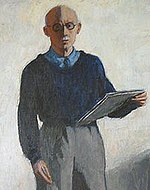Hermann-Paul, Date of Birth, Place of Birth, Date of Death
TweetHermann-Paul
French artist and illustratorAbout Hermann-Paul
- René Georges Hermann-Paul (December 27, 1864 – June 23, 1940) was a French artist.
- He was born in Paris and died in Saintes-Maries-de-la-Mer. Recent efforts to catalog the work of Hermann-Paul reveal an artist of considerable scope.
- He was a well-known illustrator whose work appeared in numerous newspapers and periodicals.
- His fine art was displayed in gallery exhibitions alongside Vuillard, Matisse and Toulouse-Lautrec.
- Early works were noted for their satiric characterizations of the foibles of French society.
- His points were made with simple caricature.
- His illustrations relied on blotches of pure black with minimum outline to define his animated marionettes.
- His exhibition pieces were carried by large splashes of color and those same fine lines of black.
- Hermann-Paul worked in Ripolin enamel paint, watercolors, woodcuts, lithographs, drypoint engraving, oils, and ink. On the eve of the First World War, he made quite an impression as part of M.
- Druet's "First Group." As noted by the Burlington Magazine for Connoisseurs, the exhibition was "chiefly remarkable for a series of paintings or drawings - it is hard to say which - by M.
- Hermann-Paul in a new medium which is simply ripolin." The Great War soon intervened and Hermann-Paul would document its tragedy as well as its foibles.
- After the war, he underwent several stylistic changes.
- In his later years, he produced many works in dry point and ink depicting his beloved Camargue.
Read more at Wikipedia
See Also
- Famous People's Birthdays on 27 December, France
- Famous People's Birthdays in December, France
- Famous translator's Birthdays on 27 December, France
- Famous translator's Birthdays in December, France
- Famous illustrator's Birthdays on 27 December, France
- Famous illustrator's Birthdays in December, France
- Famous painter's Birthdays on 27 December, France
- Famous painter's Birthdays in December, France
- Famous caricaturist's Birthdays on 27 December, France
- Famous caricaturist's Birthdays in December, France


 Date of Birth:
Date of Birth:  Place of Birth: 7th arrondissement of Paris, Île-de-France, France
Place of Birth: 7th arrondissement of Paris, Île-de-France, France